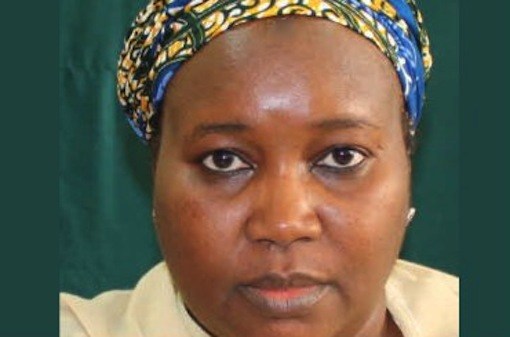
There is a raging controversy about the familial relationship between Amina Bala Zakari, a commissioner at Nigeria’s Independent National Electoral Commission (INEC), and President Muhammadu Buhari. The main opposition Peoples Democratic Party (PDP) alleges that she is a niece to Mr. Buhari. Quite swiftly, the administration refuted the claim forcefully. Amidst the back-and-forth, INEC chief, Mahmood Yakubu also waded in. In response to a question from a journalist, he wondered how the embattled commissioner could be considered a blood relation of the president if their states of origin are different. Her family also came out to declare that their daughter is not related to the president. They did not lie. But they also did not say the entire truth.
She Is Family
A thorough investigation by PREMIUM TIMES, the online newspaper that publishes this column, reveals there is some affinity between Mrs. Zakari and Mr. Buhari. True, there is no blood relationship like the PDP alleges. And clearly in this regard, the PDP exaggerated a great deal. Still, it has been established, even by the admission of the Presidency, that Mrs. Zakari and Mr. Buhari are related by virtue of inter-marriage between their extended families. And at some point during Mr. Buhari’s younger years, he reportedly resided with the family of the electoral commissioner. It has also been reported that Mrs. Zakari and Mr. Buhari worked together in the past. In the African context, and especially in the Northern tradition, Mrs. Zakari would be considered family in Mr Buhari’s home and vice versa.
That said, it has also been revealed that the president had little or nothing to do with Mrs. Zakari’s appointment to the electoral commissionership. Contrary to popular discourse, she was not recommended to the position by Mr. Buhari. A respectable member of the civil society revealed to a reputable television station that he was privy to the proceedings that led to her appointment. According to him, it was Kaduna state governor, Nasir El-Rufai who recommended Mrs. Zakari for the commissionership and in fact personally handed her resume to him for submission to former President Goodluck Jonathan, who was head of state at the time. The same civil society luminary also insists that as far as he understood the meaning of the word “niece”, Mrs. Zakari was indeed a niece to Mr. Buhari via the marriage bond. In any case, the close association between Mr. El-Rufai and Mr. Buhari, and the history both gentlemen share with the unassuming Mrs. Zakari, makes her conflicted.
But what was the cause of the initial uproar? And why now? After all, Mrs. Zakari was appointed by Mr. Jonathan of the then ruling PDP, which is now in opposition. Eyebrows are raised now because Mrs. Zakari was recently appointed to the headship of a “collation centre committee”, supposedly tasked with ensuring that all the logistical needs of the “collation centre” for the upcoming elections are adequately taken care of. My view on hearing the news of the appointment was that it was a brazen and insensitive move. And even after the revelations and investigations that ensued, my view remains unchanged. Mrs. Zakari is a controversial choice for such a potentially influential role. It is also highly unlikely that the INEC chief was caught unawares by the controversy the move generated.
Mr. Yakubu, a professor of history, likely knew the implications of appointing her to what ordinarily would be a logistics function but could be misconstrued to mean more; and could in fact be more. Besides, as the Commission already has a proper organisational structure which covers operations and the like, there was really no need for the creation of an adhoc “collation centre committee”. True, as the INEC chief insists, Mrs. Zakari would not be involved in the process of collation itself. That job is exclusively his as the chief returning officer. But this is Nigeria. And since the experienced Nigerian academic rose through the complicated Nigerian system, he is certainly not naïve to the point of not knowing the potential interpretation and consequences of the controversial appointment.
No Guarantees
It is important to point out that this controversy is presently raging against the backdrop of Mr. Buhari’s refusal to sign what has been adjudged a superb amendment to the current electoral law that would make our elections better. And while the Zakari controversy was still raging, INEC’s Yakubu revealed there would not be a full electronic transmission of results. Why? A backing in law is required. A pilot electronic collation would be done, however. As it stands right now, so much flexibility has been built into the electoral process that incumbents, should they choose to, would be able to steer the process in their favour.
Doing the Needful
In light of the foregoing, can INEC be trusted to deliver free and fair elections? No one can say for sure. There are a couple of things the electoral body could do to reduce fears of potential bias, however. There should probably not be a collation centre committee in the first place. It should be disbanded. As Mrs. Zakari is clearly conflicted, albeit largely adjudged to be competent, she should be assigned to a commissionership that would not involve direct participation in the electoral process or put her in a position to affect the outcome, if she chooses to, in a material way. Should she resign? No. And considering that the Commission has decided the transmission of results would not be electronic, it should do its utmost to ensure that the collation of results at each stage of the electoral process is done in the presence of all relevant stakeholders such that a parallel collation of results by non-INEC bodies would be no different from its own.
Rafiq Raji, a writer and researcher, is based in Lagos, Nigeria. Twitter: @DrRafiqRaji
END

Be the first to comment